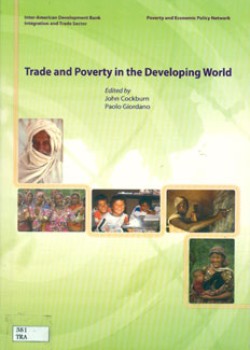
Trade and Poverty in the Developing World
Editor: Cockburn, J. and Giordano, P..
Publisher: Poverty and Economic Policy (PEP)
Year: 2008
Page Numbers: 135
Acc. No: 3377
Class No: 381 TRA
Category: Books & Reports
Subjects: Trade
Type of Resource: Monograph
Languages: English
Since the late eighties, developing countries have progressivelyintegrated global markets through unilateral broad structural economicreforms, bilateral free-trade agreements and multi-party tradenegotiations. From a developmental perspective, after almost thirtyyears of trade reform, the degree of tariff liberalization, on average,has not coincided with proportional reductions in overall poverty, asinitially expected. Although several factors beyond trade policy appearto have contributed to this divergence, it is also true that the linksbetween trade openness and poverty are not well understood, thusmaking it particularly difficult to design and implement trade-inducedpro-poor public policies. In this context, further research – based onnew methodological approaches, improvements on existing techniquesand accessibility to high-quality data – and continued dialogue withpolicy makers are two key conditions to ensure the political viabilityof trade reform and to strengthen its poverty nexus. In this paper, the authors review some of the theoretical and empirical literature that link trade, growth, and poverty. They conclude that it is not possible to draw strong conclusions regardingthe pro-poorness of trade-induced growth. However, some of thereviewed literature presents evidence of the pro-poorness of tradeinducedgrowth when combined with other policies such as increasedaccess to capital, technical assistance, reduction in transaction costs,and investment in better infrastructure (both in quantity and quality).In summary, the authors concur in recognizing the limitationsof existing empirical evidence and analytical methodologies whichare supposed to deliver critical findings to assist in designing concretepolicies as part of a pro-poor trade strategy. The collection of articles presented herein, therefore, constitutesa necessary starting point for policymakers seeking to harness tradeto sustain growth and reduce poverty, and for researchers interestedin serving the policymaking process by compiling sound and relevant empirical evidence. This paper tries to assess the relevance of trade in achievingpro-poor growth through a survey of the existing literature.



